: Delving into a Complex Past

4.7 out of 5
| Language | : | English |
| File size | : | 1989 KB |
| Text-to-Speech | : | Enabled |
| Screen Reader | : | Supported |
| Enhanced typesetting | : | Enabled |
| Word Wise | : | Enabled |
| Print length | : | 388 pages |
| Paperback | : | 276 pages |
| Item Weight | : | 1.24 pounds |
| Dimensions | : | 6.69 x 0.63 x 9.61 inches |
In the annals of American entertainment, the use of blackface and whiteface has left an enduring and controversial legacy. From the minstrel shows of the 19th century to contemporary Hollywood films, the practice of portraying black and white characters with exaggerated racial stereotypes has sparked intense debate and criticism.
In her groundbreaking book, "Blackface, Whiteface, Insult, Imitation in American Popular Culture," Jacqueline Najuma Stewart explores the complex history of race representation in American entertainment. Through a meticulous analysis of performances, films, and cultural artifacts, Stewart unveils the profound impact of blackface and whiteface on our understanding of race, identity, and the power of representation.
Unveiling the Origins of Blackface
Blackface, the practice of white performers donning black makeup and exaggerated features to portray African Americans, emerged in the early 19th century. Drawing inspiration from vaudeville and minstrel shows, blackface became a ubiquitous form of entertainment, perpetuating harmful stereotypes that dehumanized and ridiculed black people.
Stewart's analysis delves into the origins of blackface, tracing its roots to the antebellum South and the deep-seated racism that permeated American society. She examines the ways in which blackface served as a tool of racial oppression, reinforcing white supremacy and justifying discrimination.
Whiteface: A Mirror of Society's Prejudice
While blackface has been widely condemned, the use of whiteface has also raised questions about racial representation. Historically, whiteface has been used to portray both black and Asian characters, often with similar stereotypes and caricatures.
Stewart explores the complex motivations behind whiteface, arguing that it not only reflects but also perpetuates societal prejudices. She examines how whiteface has been used to justify colonialism, mock non-white cultures, and create a false sense of white superiority.
The Evolution of Blackface and Whiteface in Entertainment
Over the decades, blackface and whiteface have undergone significant transformations. From the minstrel shows of the past to the present-day practice of "racial drag," the use of racial stereotypes has evolved in response to changing social norms and cultural attitudes.
Stewart's book provides a detailed account of these transformations, tracing the ways in which blackface and whiteface have been adapted to fit different historical contexts. She examines the impact of the Civil Rights Movement, the rise of black consciousness, and the changing demographics of American society.
The Enduring Legacy: Art, Politics, and Cultural Identity
The legacy of blackface and whiteface continues to shape American culture and politics. Stewart explores the ongoing use of racial stereotypes in popular entertainment, from television shows to movies to social media. She argues that these portrayals have a profound impact on our collective understanding of race and identity.
Beyond the entertainment industry, Stewart examines the broader implications of blackface and whiteface. She discusses the ways in which these practices have been used to justify racial discrimination, perpetuate harmful stereotypes, and undermine black self-esteem.
: A Call for Critical Engagement and Racial Justice
In her compelling , Stewart calls for critical engagement with blackface and whiteface in American popular culture. She emphasizes the need for media literacy and anti-racist education to combat racial stereotypes and promote a more equitable and just society.
"Blackface, Whiteface, Insult, Imitation in American Popular Culture" is a transformative work that sheds light on one of the most problematic aspects of American history. Through meticulous research and incisive analysis, Jacqueline Najuma Stewart provides a powerful call to action, urging us to confront and dismantle the enduring legacy of racial prejudice and inequality.

























































































